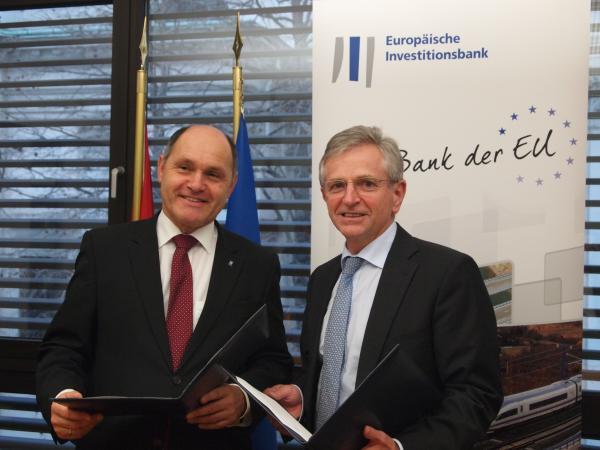
The European Investment Bank (EIB) is financing the further extension of the scientific research institute IST Austria (Institute of Science and Technology Austria) in Klosterneuburg, Lower Austria. According to an agreement between the Austrian Federal Government and the State of Lower Austria, the financing and construction of the buildings are the latter‘s responsibility. The EIB is providing a total loan of €45 million for the expansion of research facilities on the campus. It signed an agreement on the first €20 million tranche with the promoter Niederösterreichischen Landesimmobiliengesellschaft mbH in Vienna today.
IST Austria carries out fundamental research in the areas of natural sciences (currently focusing on evolutionary biology, neurosciences, cell biology and physics), mathematics and computing. This comparatively young institute – it opened in 2009 – is a joint venture between the Austrian Federal Government and the State of Lower Austria. Its staff currently numbers around 300 scientists in 28 research teams. By 2026 IST Austria hopes to be employing some 1000 researchers.
This is the EIB’s second loan for the construction of new buildings for IST Austria (the first was in 2009). The extension works are scheduled for completion at the end of 2015.
EIB Vice-President Wilhelm Molterer, who is responsible for the Bank’s operations in Austria, believes that IST Austria is already making a major contribution to scientific and technical research in Europe. “The scientists carrying out cutting-edge research at IST Austria come from more than 50 different countries. In the few years since it was founded, the institute has managed to build a reputation far beyond Austria’s borders. And now it is pursuing an ambitious growth plan. The EIB is pleased to support today’s expansion programme as it will benefit not only Austria’s research community but Europe’s knowledge society as a whole”, he said.
Research, development and innovation have long been priorities of EIB financing. In the past year the Bank has stepped up its involvement in this field and increased its investment in improving qualifications by providing finance for universities, research facilities and vocational training institutes. The EU bank also lends money for education and training grants and mobility programmes – measures aimed at improving the jobs situation for young people and tackling youth employment in Europe. The EIB alone intends to provide some €6 billion for this purpose by the end of the year.

Photographer: EIB ©To be defined
Download original

Photographer: EIB ©To be defined
Download original

©IST Austria
Download original

©IST Austria
Download original

©IST Austria
Download original

©IST Austria
Download original

©IST Austria
Download original

©IST Austria
Download original

©IST Austria
Download original

©IST Austria
Download original

©IST Austria
Download original

©IST Austria
Download original